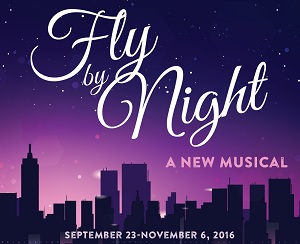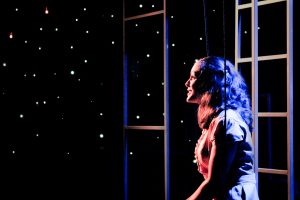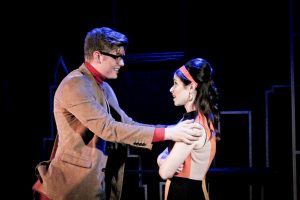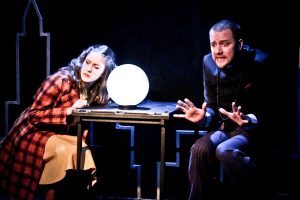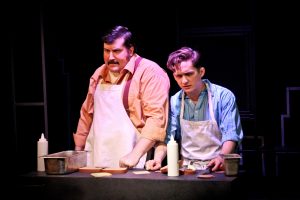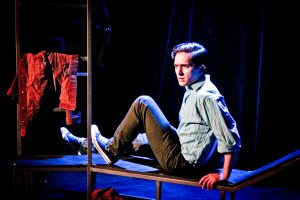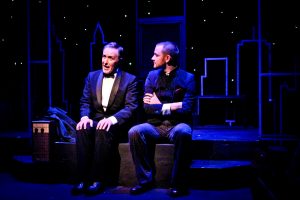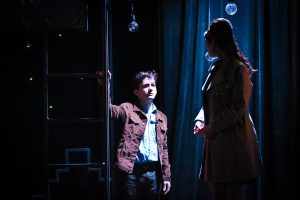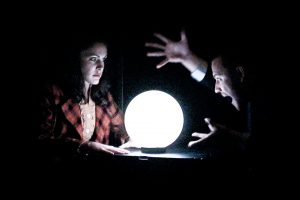BLACKOUT LOVE
Winsome and warm-hearted, Fly by Night is an affecting chamber musical which premiered in 2014 at Playwrights Horizon. The two-act labor of love by Will Connolly, Michael Mitnick and Kim Rosenstock celebrates human connectedness, most pointedly in love. In their tender-hearted, tough-minded work—an Our Town where the place is NYC–the connections are also with the universe itself, specifically the stars.
As it spins the story of the very mutable love triangle between two different sisters and a young deli worker, Fly by Night delivers the kind of wistful comic fare that captious critics could slam as somewhere between a Hallmark card and a Lifetime movie. But there’s depth in these doings. Always seeking the big picture, Fly by Night postulates that we all came from exploded stars and that we still bear that other-worldly aura. We forget it at our peril. Sometimes it takes a power failure—here, the huge Northeast blackout of 1965—to suddenly or finally make the cosmos our proper perspective.
Overly metaphorical, the sometimes contrived—as in magically realistic—happenings are unlikely but not unlikable, certainly not in Theo Ubique Cabaret Theatre’s charming Chicago premiere. Nicely shaped by Fred Anzevino and music director Jeremy Ramey, Fly by Night serves well as a showcase for six game performers, whether young or mature; they’re ripe to make real characters who might have just stood for stuff. Here they come to life in their own right.
Full of portents, epiphanies, symbols, talismans, “intersecting paths,” and coincidences, Fly by Night is nearly narrated to death by an eager Jordan Phelps, who deftly plays many big city denizens. The storyteller’s sweet, if overly shaped, plot focuses on two dreaming sisters who leave Hill City, South Dakota for the Big Apple. Daphne (Meredith Kochan) aspires to be an actress: She becomes a kind of muse—and more (“What You Do To Me”)–for rich young playwright Joey Storms (Jonathan Stombres) who’s endlessly tinkering with a hokey musical called The Human Condition. Daphne will play the lead and, if Joey succeeds, life should imitate art.
Miriam (Kyrie Anderson), Daphne’s literally star-gazing sister, goes with her to New York. Working as a waitress on the “twilight shift,” Miriam–consumed by a soothsayer’s prophecy that she will find a dark destiny and “a great fall”–befriends a recent widower Mr. McClam (Sean Thomas), a World War II veteran with a special reason to treasure La Traviata, his favorite opera. (He finally tells us why in “Cecily Smith,” a memory ballad that retroactively makes this quiet soul a font of nostalgia.)
Both sisters—the hometown girl-next-door and the ambitious Broadway baby–find themselves taken, for characteristically different reasons, with McClam’s son Harold (James Romney). Mired in a doggedly ordinary job (“Eternity”) and mourning the recent loss of his mom, this pretty boy is a wanna-be marine biologist and songwriter (“Circles in the Sand,” an anthem to turtles). In fact not fantasy, Harold is a sandwich-making wage slave to his crotchety boss Crabble (Daniel Waters): His heart is not in the sandwich-board he manages to misspell. Daphne colonizes Harold first (“More Than Just a Friend”), but her need to attend rehearsals and memorize rewrites gives Harold time to appreciate astronomy-minded Miriam (“Me With You”) for her quiet grace and sensitivity (“Pulled Apart”).
Fantasticks-like in its quirky eccentricities, the time-shifting musical intrepidly chronicles their shifting fortunes, portentously labeling the characters or content: “The Prophecy,” “The Triangle,” “The Middle,” “A New Ending,” “The Break,” “The Great Fall.” One special title is “Time Stops,” which refers to Harold’s wish to see what would happen if creation took a sudden pause (and not just from a busted clock).
On November 9, 1965, Harold more than gets his way: The lights go out all over the city that never sleeps. What results is not the looting that accompanied a later, summer blackout—but an almost Elysian calm in the storm that is NYC. It allows, improbably or not as you judge the outcome, the three lovers to sort out their fates and find hope-filled redemption in a suddenly clear and cosmic sky (“November Stars”).
Never as transient as its title, Fly by Night isn’t afraid to ask the big questions (beautifully illustrated by Brock Alter’s projections). It’s also smart enough not to answer them all. The songs, persuasive if not memorable, carry an enchantment, even if this very wishful musical employs about ten too many “signs” to tell us what and when to feel.
Above all, its core strength are the unforced and often exhilarating portrayals–Romney’s sweetly sad Harold, Anderson’s questing Miriam, and Korchan’s dynamic Daphne. (As the odd man out, Stombres makes Joey’s final catharsis plausibly philosophical.) Fly by Night proves every bit as true as it’s cute. Even better, it’s unafraid to feel a lot even if we can’t always return the favor.
photos by Adam Veness
Fly by Night
Theo Ubique Cabaret Theatre
No Exit Café, 6970 N. Glenwood Ave.
Thurs at 7:30; Fri & Sat at 8; Sun at 7
ends on November 6, 2016
for tickets, call 800.595.4849 or visit Theo Ubique
for more shows, visit Theatre in Chicago
